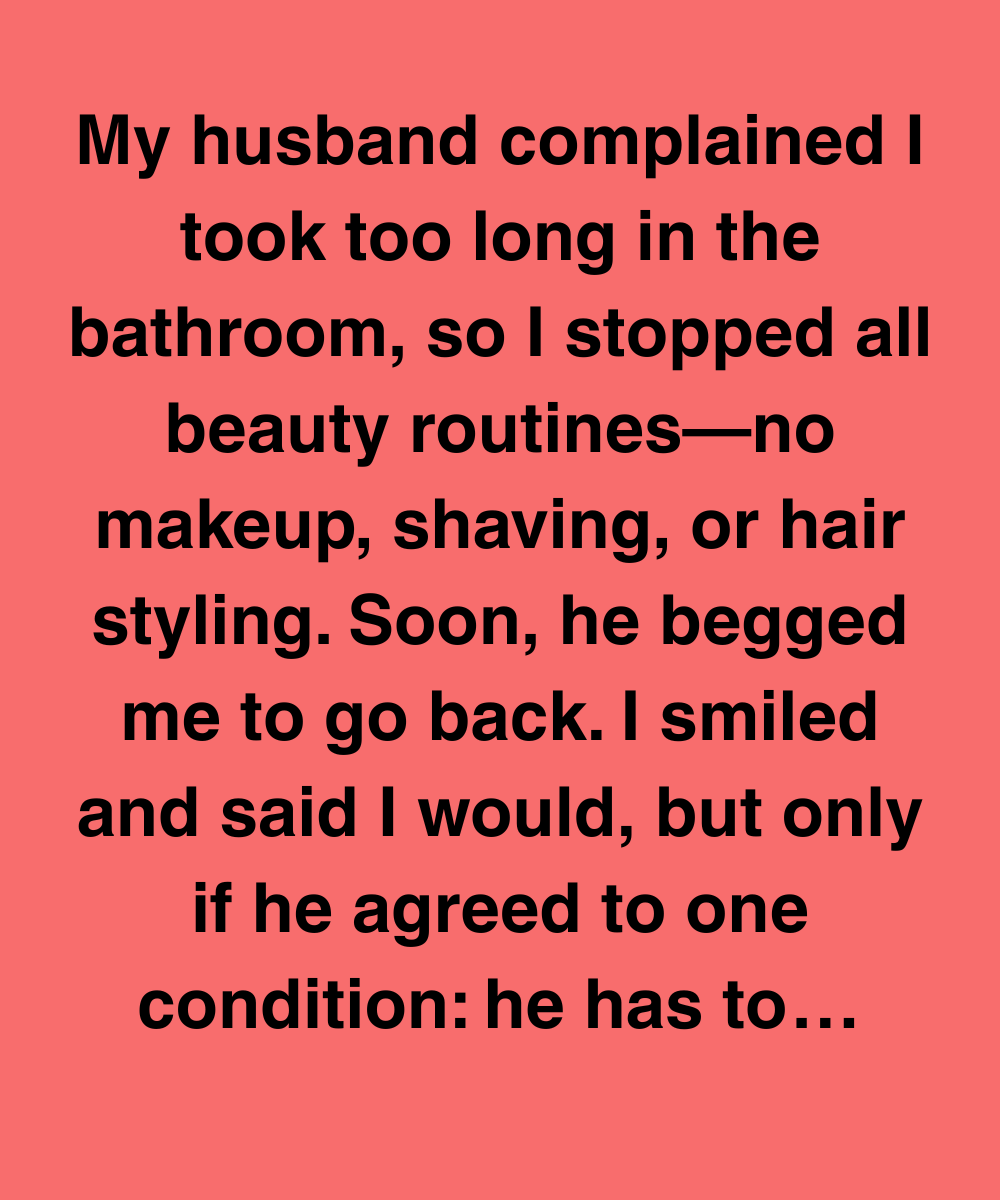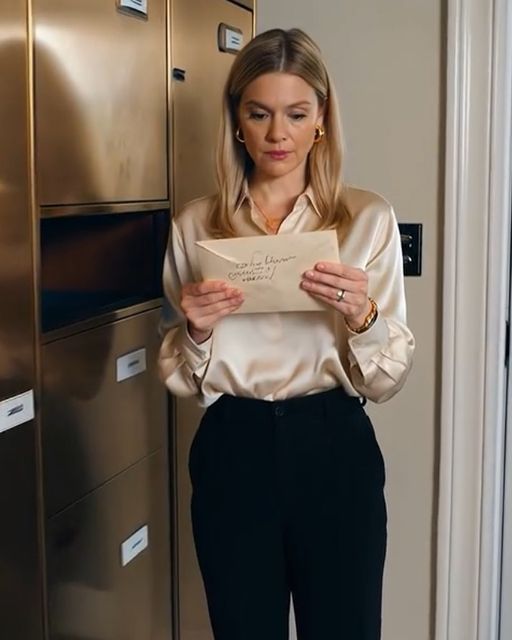My husband complained I took too long in the bathroom, so I stopped all beauty routines—no makeup, shaving, or hair styling. Soon, he begged me to go back. I smiled and said I would, but only if he agreed to one condition: he has to join me in my daily self-care routine for a full month, from the skincare masks to the hair treatments. At first, Quincy laughed it off like it was a joke. But when he saw I wasn’t kidding—and that I’d continue going au naturel until he agreed—his face fell. I think he realized he might have underestimated how much he’d taken my effort for granted.
I’d met Quincy three years before all this. He was the type of guy who looked polished in any situation—hair always in place, suits tailored like he’d been born in them, shoes that looked shinier than anything in our kitchen. And back then, he always complimented how I looked. He’d make me feel like I was the most stunning woman in the world. But somewhere between the second year of marriage and the stress of his job at the import business, his words started turning sharp. I noticed it first in the small digs: how I should “speed things up” in the morning or how my hair took up “half the sink.” The comments stung, but I brushed them off because, in every other way, he was still kind. Or so I thought.
The first morning after I decided to give up my beauty routine, I just got up, washed my face with cold water, and left it at that. I didn’t even brush my hair. When Quincy saw me in the kitchen, he did a double-take. “Everything okay?” he asked carefully. I nodded and poured myself a coffee. The silence between us felt thicker than the pancake batter I’d planned to make. He kept glancing at me like I might break down crying, but I didn’t. I went to work at the library just like that—barefaced, frizzy hair, and legs prickly enough to catch lint from my skirt.
At work, my boss Claribel asked if I’d been crying. My friend Terence offered me cough drops, thinking I was sick. I smiled and told them I was fine. And I was. Actually, it felt freeing to not obsess over every stray eyebrow hair or if my lipstick had smudged on my teeth. But it also made me painfully aware of how much of my sense of worth came from feeling “put together.” And worse, how I’d been feeding that need with Quincy’s approval.
By day five, Quincy couldn’t hide his discomfort. At dinner, he finally blurted, “Are you going to keep looking like… this?” I almost choked on my rice. “Like what?” I asked calmly. He paused, searching for words that wouldn’t get him in more trouble. “Like you don’t care anymore.” That’s when I told him I’d happily return to my old routine—if he’d commit to joining me in it every morning and evening for a month. The full regimen: 10-step skincare, shaving his legs and arms, hair masks, even learning to curl his eyelashes.
He blinked at me like I’d suggested he walk on hot coals. “You’re serious?” he whispered. I nodded. “Completely. I want you to know what it takes to meet the standard you think I should have.” He laughed a little too hard, probably hoping I’d drop it. But the next morning, I laid out two sets of supplies on the bathroom counter: mine, and his. When he walked in and saw the tweezers and sheet masks waiting for him, he hesitated. “I can’t do this,” he said. I smiled sweetly. “Then I’ll keep doing… this.” I gestured at my bedhead and stubbly legs.
The first week was hilarious. Quincy accidentally glued his eyelids together trying to put on false lashes for practice. He sliced a tiny nick in his shin trying to shave without cutting himself. The aloe mask gave him a rash, and he complained about the tightness of the clay masks on his face. He started waking up fifteen minutes earlier just to have time for everything, but still ran late more than once. Watching him struggle opened my eyes to how gendered our ideas of “effort” can be, and it opened his eyes to what I went through daily to match his standards.
Some days, he got creative. One night he tried to use a hair dryer on the cool setting to speed up his moisturizer drying. Another morning, I found him watching tutorials on contouring in our bed at 6 a.m. He took it seriously, even if he grumbled the entire time. But something shifted in his tone; his jokes became less biting, his eyes softer. He started complimenting me again, but this time it felt different. Less like he was checking off an obligation and more like he genuinely saw me.
About halfway through the month, Quincy called me from work. His voice was shaky. “Can we talk tonight?” he asked. I spent the rest of the day wondering if he was going to tell me he couldn’t do it anymore or, worse, that he was done with me entirely. When he came home, his eyes were red. He told me he’d had an epiphany while staring at his reflection with a charcoal mask on. He realized how unfair he’d been expecting perfection from me when he barely thought twice about his own appearance. He said he thought I’d leave him over how he’d treated me.
I was so stunned I couldn’t find words. The vulnerability in his face made me realize he wasn’t just saying it to end the challenge. He truly understood. I reached out and hugged him, and he held me like he’d never let go. The next morning, he got up and started our routine without being asked. He even reminded me to do my toner when I almost skipped it. The month passed, and we agreed I’d go back to my own beauty routine—but with a promise from him: no more complaints, and more appreciation for what I chose to do with my appearance.
But that wasn’t the end of it. A week after we finished, Quincy surprised me with something I never expected: a day at a luxury spa for both of us. He said he wanted to show me he’d keep putting in effort too. We spent the day getting facials, massages, and laughing about how he’d almost passed out from the steam room. He told me he finally saw beauty routines not as vanity, but as self-care—something that kept me feeling confident and strong.
A twist came when, later that month, his mother visited from out of state. She’d always been old-fashioned and believed women should “look good for their men.” I braced myself for her comments when she saw me without makeup one evening. But Quincy jumped in before she could say a word. He told her how proud he was of me for teaching him what real effort looked like and how he’d never again expect me to do more than I wanted. His mother’s eyes widened in shock, but she didn’t argue. In fact, the next morning, I caught her quietly applying a hydrating mask I’d left out on the bathroom counter. We ended up sharing a sweet moment as I helped her blend it properly.
From that day on, Quincy started complimenting other women in our lives—his sisters, my friends, even coworkers—on things beyond their looks. He’d notice when they seemed tired or when they’d clearly put in effort. His whole perspective had changed, and it was like watching a man I already loved become someone even better. Our marriage grew stronger, and our arguments over silly things like how I folded towels or where I left my shoes seemed to fade away. He started saying thank you for dinners I cooked, or telling me he appreciated how hard I worked at the library.
A few months later, I noticed Quincy spending more time with our nieces. He’d let them paint his nails and put barrettes in his hair without flinching. When my sister teased him, he just smiled and said he was practicing his “beauty skills.” The girls adored him, and I found myself falling even more in love with this new, softer version of my husband.
But the biggest twist came when Quincy decided to share his experience on his company’s website. He wrote a blog post titled “What My Wife’s Beauty Routine Taught Me About Respect.” It went viral among their employees. Colleagues—both men and women—reached out to thank him for talking about something so rarely discussed. A few of his friends admitted they’d never thought about how much time and pressure women faced to look “presentable.” His boss even commended him for setting an example of empathy.
After that, Quincy started hosting a quarterly “wellness morning” for his team, where anyone—men included—could try skincare, stretching, and mindfulness exercises. He made sure it wasn’t just about looks but about taking care of themselves, inside and out. Watching him champion these events made me tear up more than once. I never imagined our silly challenge would ripple into something that helped others.
Through all of it, I realized I’d been guilty of something too: letting his opinion control my self-worth. I’d given his words so much power that I forgot I was doing these routines for me. They made me feel good, and that was enough. Once we both understood that, it felt like the weight we’d been carrying silently for years just lifted.
Looking back, I’m grateful Quincy complained that day about my time in the bathroom. It forced us to confront something deeper. We learned respect means recognizing effort, not just enjoying the result. It means sharing the burden of expectations, or at least acknowledging them. And it means loving someone for who they are, not how fast they can get ready in the morning.
So to anyone out there struggling with feeling judged for how they look or how long they take to get ready: know that your worth isn’t measured by someone else’s timetable. And to anyone tempted to criticize their partner’s routine—maybe try joining them first. You might just discover a new respect, and a stronger bond.
Thanks for reading our story. If it touched your heart or made you think, please like and share this post. You never know who might need to hear it today.




